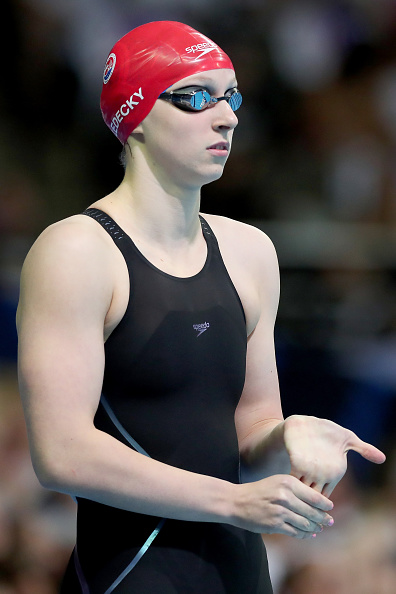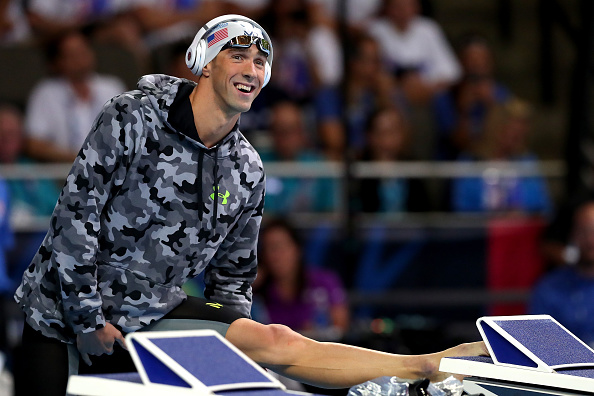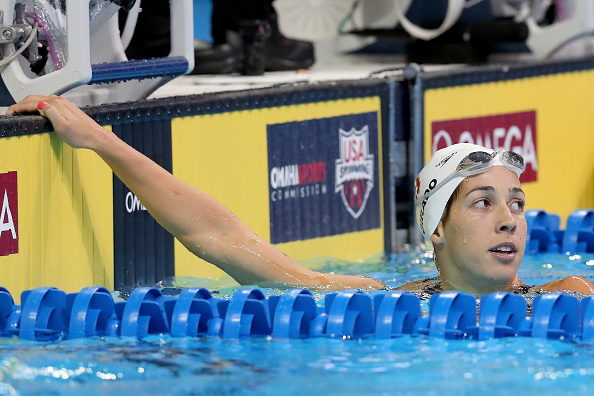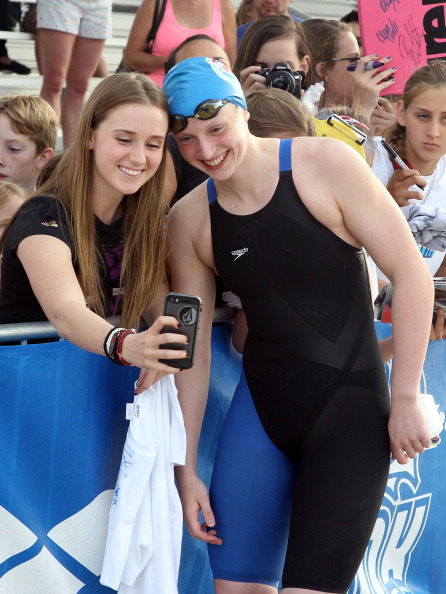OMAHA — Katie Ledecky makes swimming must-see. In-person. On TV. Online. Whatever.
Whenever the 19-year-old gets on the blocks, there is the wondrous sense of possibility in the chlorinated air.
It just feels like something might — very well — happen.
On Saturday, in the 800-meter freestyle, an event she has owned since 2012, where at just 15 she won gold at the London Olympics, Ledecky — in predictably awesome fashion — ran away with the event, winning in 8:10.32, flirting for the first half of the race with the — her own — world record.
The victory sends her to Rio to swim in the 200, 400 and 800 freestyles, plus at least one and maybe two relays.
She will be favored in all three individual events. She won all three at the 2015 swimming world championships in Kazan, Russia.
Ledecky would be favored in the 1500 if there were a 1500 at the Olympics for women. There isn’t, an anachronism. Last year, in Kazan, she won that, too.
Reflecting later Saturday on her 800 swim here, Ledecky said, “I think I can take what I did tonight and improve on that in Rio.”
She also said of 8:10.32, “It just didn’t feel like it was anything special.” That time is only the third-best ever.
To prove that she is actually human, Ledecky did not qualify here for the 100 free. She took seventh.
The thing with Ledecky is not just that she wins. That’s almost a given.
In the 100, incidentally, she is getting better each year. Watch out.
Better, just watch.
Each Ledecky swim can make for extraordinary theater.
Same with Michael Phelps, who — in his last-ever swim at the U.S. Trials, and this time he said he means it — came back strong in the second half of the men’s 100 butterfly for the victory in 51-flat. Tom Shields took second, in 51.2, just as he ran second behind Phelps in the 200 fly.
Phelps was exultant when he saw the result, slapping the water.
Later, he told the crowd that he had “choked up a hair” when talking on-camera to NBC just moments after the race, adding, “This country is the best.” He also swore -- vowed -- that 2016 is, really, it. Asked if he might consider 2020, he said, "No. No, no, no, no, no. I’m done. The body is done."
Missy Franklin pulled out another gut-check, finishing second in the women’s 200 backstroke behind Maya DiRado, who quietly won three events here while considerable attention was focused on the likes of Ledecky, Phelps, Ryan Lochte and others — that 200 back and both individual medleys, 200 and 400.
“One of the things I’ve been trying to do this whole year is not compare myself to where I was in 2012,” Franklin would say later, adding, “I came here to be the best of who I am right now, not — not the best of who I was four years ago.”
At these Trials, three swimmers have won three events: Phelps, Ledecky, DiRado.
“This,” DiRado said, “is a dream.”
Phelps, starting in 2004, was the first to make swimming a destination event.
Now, Ledecky.
Which, when you stop to consider that for just a moment, is almost crazy. Unlike track, basketball, beach volleyball or whatever, you can’t see the swimmers’ faces when they compete. There shouldn’t be any emotional get.
And yet with Ledecky, there is.
In the July/August issue of the Atlantic, the last sentence of an article by Meghan O’Rourke about “extreme gymnastics,” which focuses in part on the American champion Simone Biles, makes a point about Biles that applies in equal force to Ledecky:
“When Biles takes the floor mat, what you’ll see—I hope—is not a stressed-out, anorexic little girl, but a 19-year-old athlete soaring through the air, fully enjoying herself.”
Similarly, when Ledecky gets up to race, she’s not there to do anything but immerse herself in the pursuit of seeing just how good she can be.
Fear, pressure, nerves — those are for others.
“I think I still had the same amount of fun I did four years ago,” she would say late Saturday when asked to compare the 2016 and 2012 Trials. “That’s going to be key in Rio. Just enjoying the Olympic experience. It’s an experience like no other.”
It was in 2013 — at the Barcelona worlds — that Ledecky signaled it would be showtime when she stepped on deck.
She won the 400, 800 and 1500, and a gold in the 4x200 relay, too. And set two world records.
That Barcelona 1500, featuring Ledecky, along with Lotte Friis of Denmark and Lauren Boyle of New Zealand, remains a strong candidate for best women’s distance race, ever.
A brief recap:
— At 100 meters, Ledecky was at 58.75, Friis at 59.15. This was the 100-meter world-record pace in 1971 of Australian Shane Gould.
— At 200 meters, Ledecky was 66-hundredths of a second ahead. Now they were racing at the 200-meter pace set by East German Kornelia Ender in the mid-1970s.
From 300 to 1200 meters, Ledecky let Friis set the pace. Then, at 1300 meters, Ledecky dropped the hammer. With one lap to go, Ledecky was up by 1.07 seconds. After 15 minutes of swimming, she then swam the last 50 meters in 29.47 seconds. In touching in 15:36.53, she lowered the world record, which had stood for six years through the nuttiness of the plastic suits, by six seconds.
Friis also went under the world record, by four seconds. Boyle’s third-place time would have been the best swim of 2012, an Olympic year, and by 21 seconds.
Ledecky has since lowered the 1500 mark four more times. The current mark, set in Kazan: 15:25.48.
Like Phelps, Ledecky swims hard and relentlessly, with a cold fury. That is a compliment.
Like Phelps, too, Ledecky swims extraordinarily high in the water. You don’t have to know the first thing about swimming to know which lane Katie Ledecky is in.
The snippy answer to that, of course, would be the one in which the swimmer is the one way in front.
Sure.
But Ledecky has a distinct, powerful style. Many guy swimmers have said she swims like a guy. That, too, is a compliment.
Off the blocks, Ledecky is lovely to be around. She is smart, funny and has an extraordinary support system — family, coaches, community.
When she gets up to race, however, all that has to wait.
Every Ledecky swim seemingly holds the promise of a record.
Which, she said, is for the ladies and gentlemen of the press — not her — to consider: “You guys can write whatever you want. I appreciate your coverage of the sport … I’m just going to focus on my racing and what my goals are, and anybody else’s expectations don’t really mean that much to me. No offense.”
None taken. So, consider:
Ledecky has not lost internationally in the 800 since 2012.
She won the 800 at the 2013 worlds in Barcelona.
She won the 800 at the major 2014 meet, what’s called the Pan Pacific championships.
She won in Kazan.
The all-time top-10 women’s 800 performances: all, one through 10, Katie Ledecky.
Starting in 2013, meanwhile, Ledecky has set a world record in the 800 every year:
In 2013, she lowered the mark that Rebecca Adlington had set at the Beijing 2008 Olympics, 8:14.1, to 8:13.86.
In 2014, Ledecky went 8:11 flat.
In 2015, 8:07.39.
In January of this year, 8:06.68.
The 800 she swam Saturday is nine seconds faster than she swam at the 2012 Trials: 8:19.78.
On Saturday, after 50 meters, she was already a body length ahead. At 100, almost a full second under world record pace. By 250, 1.42 under. Then she “slowed,” if that is the word, for someone who won the race by nearly 10 seconds.
To underscore how Ledecky is just in a different realm:
Leah Smith’s second-place time, 8:20.18, was the third-fastest time in the world this year. Jessica Ashwood of Australia went 8:18.14 in June.
Asked if she thought the 100 “took more out of you than expected,” Ledecky had this to say:
“Probably. It was a different week, a different set of events than I’ve done in the past and, yeah — you take three rounds of the 100 out, and my schedule gets a little easier in Rio.
“So that’s good.”







